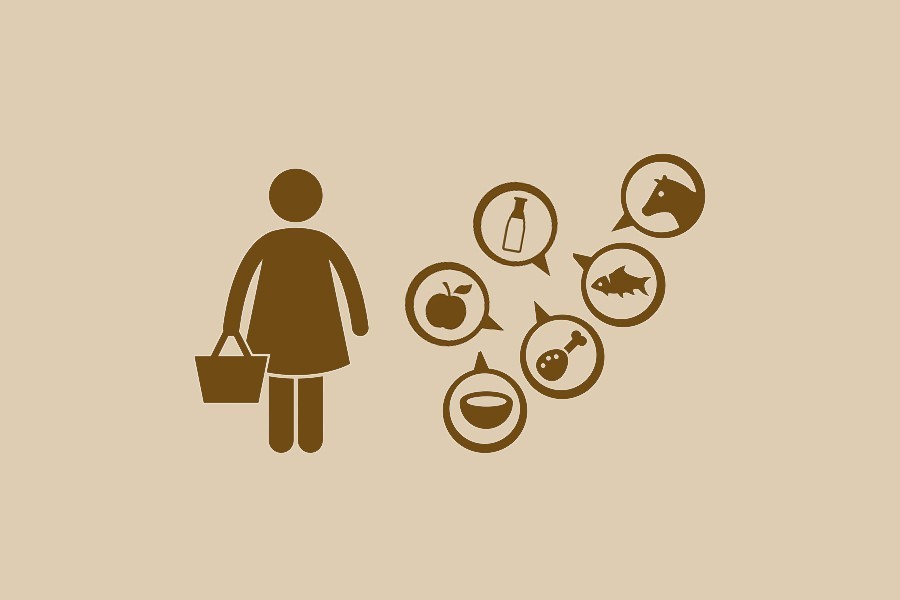After decades of relatively low inflation, food and non-food commodity prices are rising all across the world. Massive fiscal stimulus packages in advanced and developing countries, supply-chain disruptions, accumulated savings, and relatively eased monetary policies amidst the pandemic and, lately, the war in Ukraine are propelling global inflation.
In Bangladesh, CPI (Consumer Price Index) inflation recorded 6.2 per cent in February, which is higher than Bangladesh Bank's inflation target set at 5.3 per cent for 2022. Prices of some food items, namely soybean oil, coarse rice, sugar and flour, rose 44 per cent, 34 per cent, 32 per cent and 21 per cent respectively, in the last quarter of 2021 compared to the pre-Covid levels (the final quarter of 2019). However, prices of other essentials such as onions, potatoes and poultry declined markedly.
Nevertheless, the biggest risk of inflation comes from energy price which has been highly volatile given the war in Ukraine and the geopolitical tensions involved. The government is contemplating adjusting energy prices upward. If done, inflation may get fuelled further, far outstripping the central bank's inflation target.
The rising food prices are particularly worrisome for the low-income and marginalised groups. A longitudinal study carried out by the Centre for Peace and Justice (CPJ), the Brac University, shows that both the mean and median monthly income of marginalised people comprising rural poor, slum-dwellers, ethnic minorities living in the plains and the Chittagong Hill Tracts was about 10 percent lower in December 2021 than the pre-pandemic level.
Earlier, a South Asian Network on Economic Modeling (SANEM) survey conducted at the end of 2020 had found that the pandemic pushed 42 per cent of people into poverty. This indicates that the income of many households has yet to be recouped.
The 3rd round of the CPJ survey conducted in December 2021 suggests that cutting down food consumption (43 per cent ) followed by taking up low-wage jobs (33 per cent ) and dipping into savings (25 per cent ) were the most reported coping strategies of marginalised people. A little over one-third of households availed of loans in December, and purchasing food was a predominant reason for borrowing.
Over 90 per cent of respondents in the survey reported facing psychological problems due to the Covid-19 pandemic, and households' difficulties in securing food (78 per cent) during the pandemic were the leading cause of the distress.
Amidst the pandemic, rising food prices could further derail the recovery of marginalised households as food, beverage and tobacco carry 58 per cent of CPI weights, which is even higher for rural households (61 per cent).
There is no official CPI for the underprivileged people. A CPI calculated based on the SANEM and General Economics Division of the Planning Commission of Bangladesh survey conducted in 2018 shows that the average food consumption is 61 per cent of the total consumption expenditure of the urban marginalised households and 65 per cent of the rural households. The relatively higher marginal propensity of consumption of the poorest section of the population means food inflation eats up a significant proportion of their income.
Thus, given the income loss during the pandemic, insulating the marginalised populations from food inflation should be one of the government's top priorities. In fact, this section of the population has high expectations from the government so far as recovery from the pandemic is concerned. The overall proportion of households who think their community would be included in the government economic recovery initiatives increased in successive surveys of CPJ, with 56 per cent of households showing inclination in December.
There are several ways of protecting marginalised people from food inflation. One of the approaches is to use the existing support networks, including those extended during the pandemic, under the supervision of local-government institutions. However, the coverage by those networks needs to be expanded.
Two-thirds of the households in the CPJ survey reported not receiving any support from any source in December. Besides, proportions of financial assistance and food support declined with successive rounds of surveys. The survey also shows that the majority of the households which mentioned receiving support, received it from the 'local government,' as it was the most commonly used conduit for the government.
As cash value erodes fast during inflation, more efforts should be given to providing food support to economically struggling households. The CPJ survey shows that about 10 per cent of households had access to government-subsidised food. This coverage should be extended, ensuring that marginalised groups are treated fairly in distributing family cards used for purchasing subsidised food from the Trading Corporation of Bangladesh (TCB). Nearly half of the households are dissatisfied with the government's food distribution, the CPJ survey find. There is a need to assess the underlying causes.
The dual shocks of the pandemic-induced income loss and food inflation make the marginalised communities further vulnerable. Inflation, in particular, is a de facto regressive tax that hurts the poorest most and worsens income distribution. The provisions of food-support programmes designed and implemented to mitigate the pandemic's adverse impacts should be revisited amid the rising prices of essentials.
Microdata generated by CPJ and other academic institutions can help map the specific needs of vulnerable groups based on age, sex, location, disability, and other socio-economic indicators. The greater usage of household-level data in policy formulation can better cater to marginalised groups' needs, protecting them from further vulnerabilities.
Dr M Shahidul Islam is a Research Fellow and Hossain Mohammed Omar Khayum is a Research Associate at the Centre for Peace and Justice (CPJ), Brac University. They can be contacted at: [email protected] and [email protected].
Views expressed in this article are those of the authors and do not necessarily reflect the positions of Brac University.


